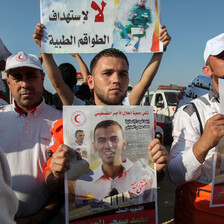The Electronic Intifada 20 May 2021

Children are being traumatized by Israel’s attack on Gaza.
APA imagesIt felt like the last time I would see my family.
Late at night, the Israelis launched a massive bombardment which went on for about 40 minutes. Al-Karama, the neighborhood in Gaza where I live, was among the places targeted.
I kept looking toward my wife and our two children.
Every minute we could hear at least three explosions nearby. Our house shook heavily.
We felt like we could die at any moment.
We are now experiencing the fourth major Israeli attack on Gaza since December 2008. The explosions during this attack seem louder than during the previous three.
I am sure that our entire neighborhood is in shock.
Israel is using very powerful weapons, many of them made in the US.
They are likely to include the GBU-31 and GBU-39 bombs.
It is clear that US weapons are being used with the intention of destroying infrastructure and spreading fear among the public.
Frightening
During daylight hours, we can hear Gaza being bombarded non-stop – especially from artillery.
Everything is much worse after dark. It is frightening.
There are drones flying above us constantly.
It is impossible to sleep. A series of airstrikes takes place every three hours or so.
The airstrikes tend to last for about five minutes. Five minutes of extreme violence.
Mothers in Gaza curse every single day that Israel attacks us.
My wife, Sarah, hugs our children, Khalil and Seba, and retreats into a corner of the house.
She only moves when it is necessary. The terror inflicted on us by Israel means that my children are often bursting into tears.
Many mothers have been killed. Those still alive fear that the next air raid will kill their children.
Both my children are less than 3 years old.
Why should children so young be under so much stress? I do not know if they will be able to cope with the trauma as they get older.
Document everything
We normally prepare for the holiday of Eid al-Fitr by baking cookies. We would celebrate Eid by eating salted fish for breakfast.
We would don new clothes and visit relatives.
Since she became a mother, Sarah has taken delight in dressing our children at Eid.
The celebrations for Eid were canceled this year because we were under attack.
“I bought very nice clothes for the kids,” Sarah said. “But unfortunately, they have not worn them yet. The celebrations did not happen this year.”
“The new clothes that mothers bought for many other children have been buried under the rubble,” Sarah added. “It may sound silly but I have put the new clothes for our kids in the bag we have prepared in case we need to evacuate our home. I want to celebrate with them once all of this is over.”
Eid fell shortly before Nakba Day this year. Nakba – the name given to the 1948 ethnic cleansing of Palestine – means catastrophe.
The latest Israeli attack has also been a catastrophe for Palestinians.
Whole families have been obliterated.
People have been forced to leave their homes in their tens of thousands.
We can smell destruction in the alleys of our refugee camps.
If I die, then I have a simple request for those who survive: Document everything.
If we have no more electricity and cannot use the internet, write with whatever you can find. Write on your own body, if you have to.
Someone must tell our story.
Hamza Abu Eltarabesh is a journalist based in Gaza.





